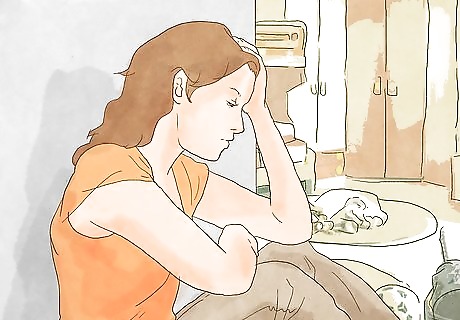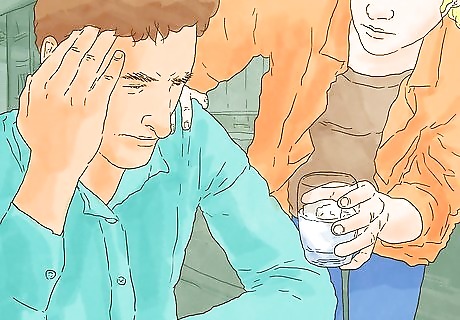
views
Recognizing High Functioning Bipolar Disorder

Notice whether your mood swings from high to low and back again. A very irregular mood is typically the defining characteristic of bipolar disorder. A manic episode usually lasts for seven days or longer, a hypomanic episode typically lasts for four days or longer, and a depressive episode usually lasts for two weeks or longer. If your mood tends to follow a pattern of highs and lows, it’s worth investigating further to see if bipolar disorder could be the cause. You can gain more insight into your mood patterns by keeping a log. Use a journal to track your moods at certain intervals in your day, such as breakfast, lunch, and dinner. You might also want to include information about what could have prompted a change in mood, like a fight with a partner or a poor night's rest.

Check for periods of extreme happiness, confidence, or agitation. Mania – the term for a period of elevated mood – can cause feelings of optimism and high energy. It can also cause anger, irritability, and reckless behavior. People experiencing a manic phase may go on spending sprees, engage in risky behaviors, act hyperactive, or get in fights. Some people with bipolar disorder may experience periods of hypomania, which is a milder version of mania. Hypomania can lead to a full-blown manic episode if it isn’t addressed.

Consider whether you’ve experienced depressive episodes. Periods of depression are usually a key feature of bipolar disorder. During a depressive phase, you might feel hopeless, guilty, or empty. You might also find it hard to think or lose interest in activities you once enjoyed. It’s also common to have sleep problems or aches and pains during a depressive episode.

Think about whether meeting the demands of life wears you out. Do you hold yourself together all day, perform well at work, and then collapse with exhaustion as soon as you get home? Everybody gets overwhelmed sometimes, but if carrying out your responsibilities feels difficult, bipolar disorder may be one possible explanation. For example, maybe getting out of bed each morning often requires a great deal of energy for you. Or, perhaps you have difficulty with other tasks, such as completing schoolwork, preparing meals for yourself, or paying bills on time. Having trouble in various areas may be an indicator of a problem.

Be open with your doctor about how you feel. If you’re having a hard time dealing with the demands of life, let your doctor know. Don’t downplay your symptoms out of a sense of pride or embarrassment. It’s your doctor’s job to help you, and if they don’t know how much you’re struggling, they won’t be able to prescribe the right medications or make other appropriate recommendations. Don’t say, “This week has been really tough.” Instead, say something like, “I’m missing classes and I can’t focus enough to study.”

Get a medical diagnosis. Regardless of your own impressions of your mood and functioning, you will need to receive an official diagnosis from a psychiatrist or other mental health provider before you can verify that you have high-functioning bipolar disorder. If you feel like a doctor isn't taking your concerns seriously, try seeking a second opinion. It may require several assessments to clarify your condition. It can also be difficult to differentiate between bipolar disorder and other disorders, so it is important to have a thorough evaluation and to be honest about your symptoms. Once you have received a diagnosis, talk with your doctor about whether any treatment is required or if you simply need to make lifestyle changes.
Knowing Your Limits

Avoid trying to do everything during the times you feel well. Episodes of mania and depression are often punctuated by periods when your mood is normal. Don’t assume this means you’re “better.” Keep following your doctor’s directions during these times, and avoid getting too stressed or taking on more than you can handle. It can be tempting to take advantage of "good days" and load up your schedule. Avoid taking this route, as it can worsen your mood and throw off your recovery. Turn down requests to take on more work or obligations right now. Focus on your health.

Take your medication as directed every day. Taking a mood stabilizer is a very important part of treating bipolar disorder. Follow your doctor’s instructions for any medications you’re taking. Do not stop taking medication without talking to your doctor first. If your medications are causing uncomfortable side effects, tell your doctor so they can come up with a solution. If you feel fine, that’s a sign that your medications are working – not a sign that you don’t need them anymore.

Limit your stress as much as possible. Stress can exacerbate basically all mental health conditions, making minor symptoms become severe. When you’re stressed, you’re more likely to have a manic episode or spiral into a depressive funk. Keep your stress levels low by not overscheduling yourself, practicing relaxation techniques, and exercising your creative muscle regularly. Try out various relaxation techniques to see which ones work for you. Meditation, deep breathing exercises, and visualization are a few good exercises to consider. It may also help to reach out to others for support and practice self-care. For example, you can make a standing date with your best pal to hang out and watch comedy films or videos.

Monitor your moods. Check in with yourself regularly and evaluate how you’re feeling. Think about which circumstances and events tend to trigger a bipolar episode for you, and be especially aware of your mood at these times. It’s typically easier to catch a manic or depressive episode early than to stop it when it’s in full swing. Writing in a journal can be a good way to track your mood.

See your doctor regularly. Talking with your doctor will help you stick to your treatment plan and take an active role in your own well-being. Even if you don’t think you need to, continue visiting your doctor on a regular basis. You might say, "I have been recording my moods and noticing that they are stable" or "I've been having trouble sleeping lately." Be honest in order to get the best care possible.
Living a Balanced Life

Stick to a schedule. Knowing what to expect every day can help keep your stress and mood level down. People with bipolar disorder tend to work best when they follow a relatively strict routine. Try coming up with a schedule that works for you, and sticking to it. Designate certain times for sleeping, exercising, working, and preparing meals, and try to stay consistent even on the weekends.

Prioritize sleep and rest. You’re more likely to get stressed out or overwhelmed when you’re tired. Plus, lack of sleep can be a symptom of mania or even trigger it. Try to get at least eight hours of sleep a night, and build time for rest into your daytime schedule. It’s best to go to sleep and wake up at the same time every day. Also, try creating a nighttime ritual that signals to your body that it's time to rest. Include activities like taking a bath, dimming the lights, lowering the temperature, and reading a mild book or story.

Choose your diet carefully. The right foods can help you regulate your mood, while the wrong ones can make you feel worse. Aim to eat plenty of vegetables, whole grains, fruits, nuts, and legumes. Avoid processed sugar, which can send your mood into a tailspin. Consider tracking your nutrients to make sure you’re getting everything you need. Nutrient deficiencies may affect your mood. Avoid caffeine and alcohol. Both may throw off your mood, and alcohol might interact with any medications you’re taking.

Get regular exercise. Schedule time every day to take a walk, go for a swim, or hit the gym. Whether you prefer gentle or intense exercise, regular workouts can help ward off depression and boost your overall well-being. You can stick to a workout routine by asking a friend or family member to join you. This can promote healthy and positive social connection and allow you both to benefit from the mood-boosting impact of endorphins.

Cultivate a support network. Social support is an essential component of a healthy, balanced life. Make time for the relationships that matter to you, and see your friends and family on a regular basis. If people in your life aren’t supportive or understanding about bipolar disorder, consider joining a support group to meet others who are dealing with the same issues as you.

Know what to do during a bipolar episode. Make an emergency plan ahead of time instead of waiting until your mood starts unraveling. It’s often possible to prevent a full manic or depressive episode from developing if you spot the early signs and take action in time. A good emergency plan should include calling your doctor right away, engaging in activities to regulate your mood, and avoiding situations that make you feel stressed or angry.



















Comments
0 comment